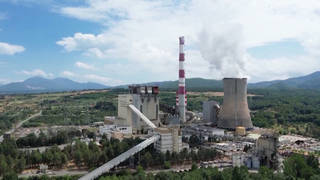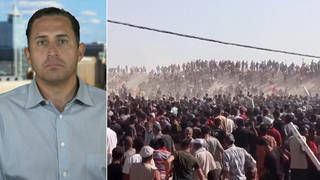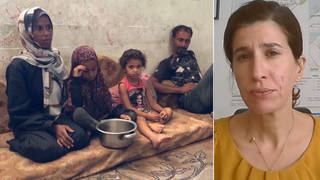
The Defense Department and weapons contractors provide massive amounts of funds to universities and colleges across the country for military-related research. We take a look at Carnegie Mellon University, one of the largest academic military contractors in the country. [includes rush transcript]
As the situation in Iraq grows more bloody by the day, people across the country continue to protest the war and the Bush administration’s policies through marches, rallies and acts of civil disobedience.
Dissent is usually directed towards the conventional symbols of the military-industrial complex: The White House, weapons contractors and companies like Halliburton and Bechtel. But there is one institution directly involved in the war effort that generally goes unnoticed: universities and colleges.
The Defense Department and weapons contractors provide massive amounts of funds to universities and colleges across the country for military-related research. These hundreds of millions of dollars are used to directly support scientific and technological research that help create the tools of war and fuel the military-industrial-college complex.
Carnegie Mellon University here in Pittsburgh is one of the largest academic military contractors in the country. Many of the software guidance systems, general communications networking systems and robotics technology used in Iraq were developed at CMU. So much so that some have nicknamed CMU, Carnegie Military University.
- David Meieran, an antiwar activist in Pittsburgh and member of the Pittsburgh Organizing Group in the Thomas Merton Center. He is one those leading the campaign against military funding of Carnegie Mellon University.
Transcript
AMY GOODMAN: Many of the software guidance systems, the general communications networking systems and robotics technologies used in Iraq were developed here at C.M.U. so much so that Carnegie Mellon has a nickname, at least according to David Meieran, our next guest, an anti-war activist in Pittsburgh, a member of the Pittsburg Organizing Group and the Thomas Merton Center, one of those leading the campaign against military funding Carnegie-Mellon University. We welcome you to Democracy Now! David.
DAVID MEIERAN: Thank you, Amy.
AMY GOODMAN: So, what’s the nickname?
DAVID MEIERAN: We the military ties at Carnegie-Mellon University are so extensive that we have dubbed the place, “Carnegie Military University.” Everywhere — every department you look, there’s some military contract, or defense, or security contract in place. From studies at the Psychology Department that are intended to help naval officers make better decisions under stress, to even in my own department, when I was a graduate student there, for terrorist detection networks. But the really big institutions that loom large in C.M.U.’s contribution to the war effort are the Software Engineering Institute, which has long been a target for anti-war activism here in the city, and now the Robotics Institute, which this year we have mounted a campaign to draw attention to the fact that many of the robotics systems that have gone into the war fighting if Iraq were developed at C.M.U. are being developed for future deployment in places like Iraq.
AMY GOODMAN: What do you mean by robotics?
DAVID MEIERAN: Well, I’ll give you an example. One weapon that is being developed is called “Gladiator.” What it is is an unmanned combat vehicle that has sitting on top of it an M-35 machine gun, and a launcher that can fire C.S. gas. It’s part of a sequence of robotics — robot vehicles that have been developed by Carnegie-Mellon University. One that just made the news recently earlier this year is “Dragon Runner,” which is a type of vehicle that can go and do surveillance and you know, go into places where the Marines for example, can not go. One of the things that C.M.U. has constantly tried to downplay is the fact that these aren’t really weapons, that they’re really for dual use and they sort of pass it off and sanitize their military ties, saying, “Well, you know, it’s like a driverless car.” But the fact remains that it’s only with these tools that the U.S. is able to sustain its quote, unquote, international peacekeeping efforts.
AMY GOODMAN: How aware of the students? How much support do you have, and how much you are criticized for this?
DAVID MEIERAN: One of the interesting things is just — no one in the university that you speak to has any idea of just how extensive the military ties are. So, for example, students will go to a psychology study and not know that they are indirectly contributing to the military academic complex. Or people will apply for a job, not knowing that their programming is actually being funded by or is supporting some military project of some sort. So, one of our demands that we have in our campaign is for the university to reveal the full scope of its military ties. There are many, many different — I mean, one of the problems is that for any university as big as Carnegie-Mellon, it’s difficult to really identify, because the funding streams associated with military come from so many different sources. The Department of Defense, of course, D.A.R.P.A., O.N.R., there’s a stream of acronyms that many people are unaware of, and then there are all those third party contractors, when Boeing and Lockheed contribute funds to either individual researchers or centers like the Robotics Institute and Software Engineering Institute.
AMY GOODMAN: So the weapons contractors contracting with the university as opposed to the Pentagon directly doing it?
DAVID MEIERAN: Yes, and one of the things that’s also been happening is this development of what’s called “future combat systems,” which is the whole vision that’s being unfolded in the new U.S. military with the idea by 2010, I believe it’s 30% of the armed forces are supposed to be unmanned and operating with elaborate networking systems, and robotics systems. So, the way that’s been working is rather through a network of different, quote, companies, working together. Largely, Boeing is the main one behind it, but there’s all of these other companies involved. General Dynamics, Lockheed, Jet Propulsion Lab at NASA. So C.M.U. is one of many different entities that are contributing to this overall war effort and this sort of high-tech, sanitized form of warfare that we are seeing.
AMY GOODMAN: We have been hearing rumors that the head of the Department of Homeland Security, the former Pennsylvania Governor, Tom Ridge will be resigning, although that hasn’t turned out the way other members of the cabinet, at least so far. Does he have a special relationship, being the former Governor of Pennsylvania, to Carnegie Mellon?
DAVID MEIERAN: Well, shortly after he was named into office, President Cohen of Carnegie Mellon university was named to the Homeland Security Council. One article reported that C.M.U. hit the jackpot when it comes to Homeland Security and reported that C.M.U. was receiving as much as $100 million in Homeland Security funds.
AMY GOODMAN: We’re talking military. What about other parts of the university? You are a graduate student in —
DAVID MEIERAN: Philosophy.
AMY GOODMAN: So, would you have anything to do with that?
DAVID MEIERAN: Well, the irony is that one of the professors that I work with, and was a T.A. for, invited me to be a researcher for a project that he was working on to detect terrorist cells. So even in the Philosophy Department, there are military ties.
AMY GOODMAN: What do you mean to detect terrorist cells?
DAVID MEIERAN: Well, it was a — an algorithm that was used to sort of look at communication patterns and see whether or not there were — because of the sort of different cells that are involved in communications and difficulty identifying, quote, unquote, terrorist cells. There was a need for an elaborate computer system in order to do that. One of the reasons why that is sort of ending up in the Philosophy Department at C.M.U. is because just as Carnegie Mellon has — many people describe Carnegie Mellon as a big Computer Science Department turned inside out. So, in any case, one of the things that we have done here in our local campaign with Carnegie Mellon is to any time we have — with the Pittsburgh Organizing Group — an action that’s associated with the war, we really try to bring it back to Carnegie Mellon University since it stands out as this big anti-war symbol. So in January of 2003, there were thousands of people who were gathered outside the Software Engineering Institute and it was in fact at that action that I decided to withdraw from Carnegie-Mellon and dedicate my efforts to anti-war activism than contributing to the war effort.
AMY GOODMAN: What about the idea that robots mean fewer U.S. casualties?
DAVID MEIERAN: That’s sanitized warfare. It makes it easy for the government to pass off that it can go out and massacre civilians without affecting the troops here at home. It’s part of a larger effort, I believe with — to sanitize warfare, that also includes less lethal weapons, as a chief part of its mainstay.
AMY GOODMAN: Let’s talk about less lethal weapons. It seems to be what you have focusing most of your efforts on right now. We only have a few minutes, but one of the stories that has not gotten very much attention in the last month, which in one odd way involved baseball, was a young woman who died in Boston the night that people in Boston were celebrating the Red Sox victory. You can talk about that, and what that has to do with less lethal weapons.
DAVID MEIERAN: Sure. The weapon that actually killed the student in question, Victoria Snelgrove was an FN303 Launcher. It was the same weapon that we saw in Miami, when they fired at us at the Free Trade Area of the Americas protest in November. The weapon was actually purchased by the Boston Police Department for use against protesters at the Democratic National Convention. In the end, they didn’t use it there, although they wielded it as a way to intimidate protesters and subdue them, but this was the first time that that particular weapon, as far as we know, actually resulted in a fatality. It’s interesting that the officer who actually fired that weapon, which fires this pepperball projectile, was a trained instructor in the use of that weapon, yet he fired it in defiance of the manufacturer’s specifications which say: “You don’t fire it at head level,” and basic common sense. So what happened is that the weapon imploded in her eye and ended up killing her. In the aftermath of that, another group that I’m involved with, the Save Our Civil Liberties Campaign together with Massachusetts National Lawyers’ Guild launched a campaign to curb the use of less lethal weapons until there’s more independent research and testing done on them. But the FN303, the launcher that killed Victoria Snelgrove is just the tip of the iceberg. From tazers to sonic devices called long range acoustic devices, there’s this new cornucopia of less lethal weapons that are being used, both in Iraq and at the war on home on our own populations.
AMY GOODMAN: You mentioned tazers quickly. We have 60 seconds. We have heard in the last week about tazers used on the six child in Miami and a 12-year-old girl. The six-year-old child, because he was about to hurt himself. What was — what was the tazer that was shot at him? What did it do?
DAVID MEIERAN: Well, the tazer is actually part of this — is being manufactured by Tazer International, which is one of the fastest growing companies in the stock market. I think either today or Monday, its stock is actually splitting. And what you don’t hear about the tazer is that it is used for compliance in prisons, and that it has resulted in numerous fatalities, just two alone in the last few weeks. So Amnesty International, for example, has called for a ban or a moratorium on the use of tazers, pending further investigation, and what again we see with those examples of the 6-year-old boy and the 12-year-old girl is that rather than curtail or limit the effects of violence that they’re supposedly supposed to do, and as opposed to using regular firearms, they actually increase the threat of violence, because officers are more likely to resort to something that they believe to be less lethal, you know, rather than using conflict resolution or negotiation and other forms of…
AMY GOODMAN: David Meieran, your website.
DAVID MEIERAN: I encourage people to visit, www.nolesslethal.org where they can find out less lethal weapons and how to challenge their use in cities across the country.
AMY GOODMAN: David Meieran, anti-war activist here in Pittsburgh, member of the Pittsburgh Organizing Group and the Thomas Merton Center. We thank him for being with us.












Media Options